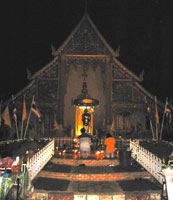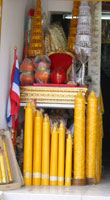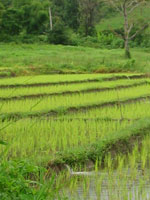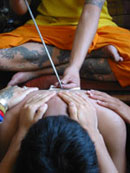The Rains Retreat
It is now official. The rainy season will last for three more months. This comes as a surprise to me as I have already been going out my door with umbrella in hand and returning with wet feet for some time. The official day for the beginning of the rains is the Buddhist holiday Khao Phansa, also known as ‘the rains retreat.’ This holiday falls on the day after the full moon on the eighth lunar month (July) and is an important religious event. Monks take up permanent residences for the next three months and many males choose to enter the monkhood during this time. With the fields all planted and rain falling most every day, what better time for teaching, studying and religious contemplation?
Khao Pansa originates from Buddhism’s early origins in India when people stayed in permanent dwellings during the rainy season to avoid stepping on and destroying newly-planted seeds. The tradition was carried over to Thailand in the Lord Buddha’s teachings and continues to this day.
day.
Asanlaha Bucha Day, also known as Buddhist Lent, falls on the day before Khao Pansa (on the full moon) and marks the day of the Lord Buddha’s first sermon after obtaining enlightenment. Buddhist Lent lasts as long as the rains retreat (three months) and during this time, many will choose to give up smoking, drinking alcohol or other forms of inappropriate behaviour as a symbol of their faith. Laymen also spend more time listening to sermons at temples and in meditation during this highly religious period.
As part of the celebration beautiful and ornate candles of all shapes and sizes and made out of beeswax will be donated to the temples by institutions and individuals alike. Besides serving the practical purpose of lighting the temple and the monks’ sleeping area, the candles are also symbolic: they represent not only an illuminated room but also an illuminated mind. Candlelit processions take place all over the country at night. People walk with lotus buds, joss sticks and candle held in prayer-like fashion around the temple three times before setting these offerings down on the temple altars; a beautiful sight to behold indeed!
buds, joss sticks and candle held in prayer-like fashion around the temple three times before setting these offerings down on the temple altars; a beautiful sight to behold indeed!
During these holidays, laymen give more financial and/or physical support to their temple. Besides offering candles, new robes, food and other basic supplies are also brought to the monasteries. It is a time of spiritual vigour. A change takes place in Thailand. Almost everywhere you look people are preparing food, purchasing candles, toting gifts, getting dressed up in modest but beautiful clothing and heading towards the temples. Many businesses are closed for these two holiday days and alcohol is not sold in entertainment venues or restaurants.
I spoke to 28-year-old Diow (meaning ‘alone’ in English) about the meaning of Buddhist Lent. He works as a tuk-tuk driver and is the father of three and was very excited to have the chance to explain his religion and culture to me. He stated, “This holiday makes sense not just in the spiritual sense but in a practical sense, too. The men are not needed to work in the fields so it is a good time for them to become monks. Every man should become a monk. It is an honour to your parents, it is the way to become a man, it is important for your heart. The monks stay inside during the rains. It is important not to step on the newly planted seeds, so it makes sense that the monks stay inside. This is not followed as closely as it used to be, especially in the big towns, but a monk should not change the place he stays during this time.”
“This holiday makes sense not just in the spiritual sense but in a practical sense, too. The men are not needed to work in the fields so it is a good time for them to become monks. Every man should become a monk. It is an honour to your parents, it is the way to become a man, it is important for your heart. The monks stay inside during the rains. It is important not to step on the newly planted seeds, so it makes sense that the monks stay inside. This is not followed as closely as it used to be, especially in the big towns, but a monk should not change the place he stays during this time.”
“The fields are planted and people have to wait for harvest. It is the financial low-point of the year for Thailand, so it makes sense to give up smoking or drinking not just for your spirit but for your wallet. If you have money and do not have to work, it is a good time to go to the temple and take a vacation, but I have to work on these holidays. If I did not, I would take my family to the temple and then have food and drink, but definitely not any whisky on these days!”
With over 95 percent of the Thai population belonging to the Buddhist faith, important religious holidays such as Khao Pansa and Asanlaha Bucha Day are as important and noticeable as Christmas or Thanksgiving would be back home. There is something beautiful and moving watching processions of candles and gifts making their way to the temples. It is a tranquil time. As the rains get ready to fall even harder, the country prepares itself for a time of peace and quiet, both inside the heart and outside the home.
